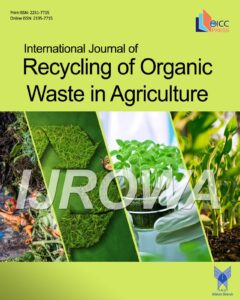
Purpose Protein hydrolysates (PHs) have attracted much interest in recent years owing to the beneficial effects on plant growth. Feather, one of the most abundant wastes generated from the poultry industry, is rich in proteins and amino acids. It can be utilized to generate value-added bioproducts such as liquid feather protein hydrolysate (FPH). This research […]
Purpose Use of silicate rock powders as fertilizer improves nutrient cycling, thus benefitting agriculture. The availability of nutrients to plants is often low, but can be increased when rock powder is vermicomposted and added. However, these powders can be rich in heavy metals, which may impair their use. We evaluated maize growth and heavy metals […]
Purpose Manure extracts possess great potential as alternate inorganic fertilizers. However, limited information exists on how manure influences plant growth. This study’s aim was to determine the impact of aerated manure extracts on romaine lettuce (Lactuca sativa var. longifolia) and Russian kale (Brassica napus var. ‘Red Russian’) in hydroponic systems. Methods Chicken, cow, and turkey […]
Purpose A pilot composting project was initiated as part of a 200 tons/day solid waste recycling plant with active involvement of several local stakeholders. The project aimed at introducing compost production and use in the village of Al Jalameh, Palestine. This paper describes the successes and lessons from the pilot project. Methods Based on the […]
Purpose In this study, the composting and co-composting potential of coffee husk and pulp with source-separated municipal solid waste (SSMSW) was investigated. Methods Coffee husk and pulp were mixed independently with SSMSW in different proportions (0, 33, 50 and 100%), and composted in triplicates with a total of 24 composting piles for 3 months. From each […]
Purpose Composting is an environmentally sustainable alternative for bioconversion of agricultural residues into a nutrient rich product that can enhance soil fertility/microbial diversity and thereby improve agricultural productivity. The goal of the current study was to evaluate the decomposition pattern of the agro-residues and assess the maturity and phytotoxicity of the composts obtained using physico-chemical, […]
Purpose Biochar and inorganic fertilizer when co-applied have been reported to increase crop yield and enhance soil fertility. However, studies on this complementary effect on soil properties and rain-fed upland rice performance in Sub-Saharan Africa are still scanty. Methods Field factorial studies conducted over 2 years was set up to investigate the interactions between rice husk […]
Purpose The nutritional content of fermented fertilizers was determined, and the effect of its application in combination with hydrogel was evaluated in a bioassay with maize plants. Methods The fertilizers were produced in artisanal biodigesters and the bioassay was carried out in pots with CP-569 maize. The nutritional content of the fermented fertilizers was evaluated, […]
Purpose The most important factor affecting soil quality is soil humic fraction. Effects of adding carbon in soil humic compounds in arid environments have only been slightly investigated. The change in soil humic acids’ structures in relation with manure and palm compost application and the evolution of humic acids’ structures during palm composting have not […]
Purpose The work aimed to investigate the effect of cow dung and cellulolytic bacteria on humic characteristics during municipal solid waste composting. Four Bacillus isolates (B. subtilis, B. tequilensis, B. venezuelans and B. amyloliquefaciens) sourced from dumpsite soil were formulated as consortium for the study. Methods Four treatments were considered with addition of bulking agents (ratio 1:7:6) to 15 kg […]